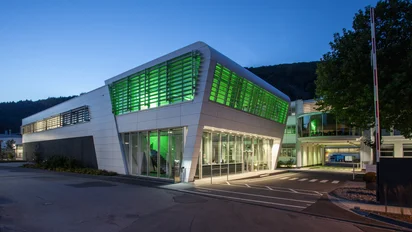Vossloh is a technological leader in the rail infrastructure segments in which it operates. Innovation plays a decisive role in ensuring that the Company remains competitive from a technological standpoint. In the interest of safety, Vossloh’s products and services are subject to detailed technical specifications and standards that must be met. Before products and services for rail infrastructure are ready for market, they usually undergo (further) development and testing for several years, as well as complex approval procedures by independent testing institutions. Research and development projects at Vossloh are therefore usually scheduled to run for several years.
To satisfy the specific expectations of customers in individual market regions over the long term and reinforce its own competitive position, Vossloh adopts a structured approach to managing innovation by continuously investing in the development and optimization of its products and services. Principles and procedures are defined in the Group-wide Innovation Playbook adopted in 2021, the implementation of which is ensured by a Group Innovation Committee. Vossloh intends to increase collaboration across business units to develop new products, services and business models and ensure that customers and suppliers – with their specific expertise – are involved more closely in research and development processes. After reviewing its production processes over recent years, the company is now implementing a range of measures which will provide ongoing efficiency gains, including modernization, increased automation and specialization.
One focus of innovation at Vossloh is digitalization as the link between hardware and services. The company uses specialized sensor systems to collect data about load levels and track condition and, since 2023, data on the condition of rail vehicles. Among other things, this data can be used to gain knowledge about the degree of wear and damage to track components. With this knowledge, statements can be made about which maintenance strategies should be applied and when. This can reduce the risk of component failure – and thus the unavailability of routes and infrastructure – during ongoing operations. Artificial intelligence also plays an important role in detecting wear patterns to predict the failure of track components and prevent these failures by planning maintenance measures ahead of time. Vossloh uses its in-depth knowledge of rail structure to meet its customers‘ main requirement “increasing track availability” and develop comprehensive solutions in partnership with all business units. Under the guiding principle of “enabling green mobility“, these ensure that the rail infrastructure is more robust and resilient and that route availability is increased, even though the demands on the rail network are constantly increasing.
